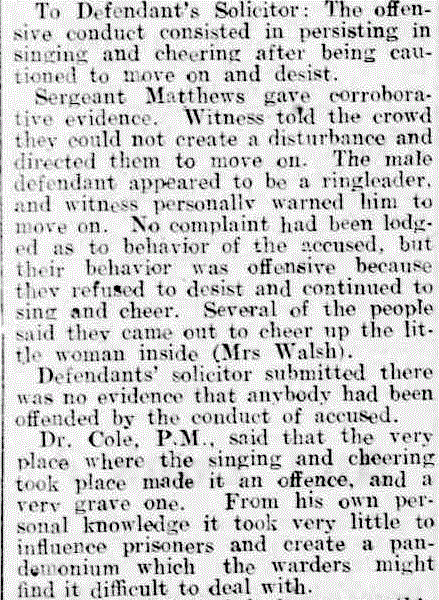Not long ago, my attention was drawn to several articles relating to a
crowd of ‘no conscriptionists’ who had gathered outside the Women’s Prison at Pentridge
to protest the imprisonment of Adela Pankhurst, daughter of English suffragette
Emmeline Pankhurst and sister of Christabel and Sylvia. Estranged from her family, she had arrived in Melbourne in 1914.
Image
of Adela Pankhurst from Wikipedia
Front
gate of Pentridge Prison c1930. Image courtesy Coburg Historical Society.
The police dispersed the crowd quickly, but Carlton couple Richard and
Lilias Mary Land were arrested, charged with ‘offensive behaviour’. Many in the crowd followed the couple to the Coburg
Police Station where they were charged, and while their supporters waited for the Lands to
be bailed, they continued singing into the night.
The following articles outline the story:
Brunswick and Coburg Leader,
11 January 1918, p.2.
Weekly
Times, 12 January 1918, p.10.
Tribune,
10 January 1918, p.5.
Brunswick and Coburg Leader,
11 January 1918, p.1.
Adela (Pankhurst) Walsh was released on 22 January 1918. Not long afterwards she and Tom Walsh moved to New South Wales.
Punch,
4 April 1918, p.32.
These events at Coburg should be seen against the backdrop of bans on peace or ‘no
conscriptionist’ meetings that had been in the news for the previous twelve
months. There is little coverage of these meetings in the local newspapers, especially
in Coburg where there appears on the surface to have been little support for
the anti-conscription or the peace movement. Yet there must have been others in
the area who supported the same anti-war and anti-conscriptionist stance as
Pankhurst, who was an organiser for Vida Goldstein’s Women Political
Association and Women’s Peace Army.
Brunswick and Coburg Leader,
1 June 1917, p.4.
Brunswick and Coburg Leader,
20 April 1917, p.1
You can read more about the peace movement, the anti-conscription campaign and other aspects of the Moreland area during World War One on the Moreland Remembers World War 1 exhibition banners.
Let me know if you can add to this story.











No comments:
Post a Comment